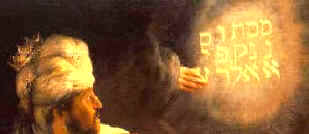Bible-Code Prophecy
"Clothing the Naked Cross"
The full code paraphrased, including the hidden 'minas'
(Part three of five parts)
***Part one should be read first,***
Fully decoded text: (200 Hebrew words in all)
E) Continued from previous page:
The beams of the cross read:
"The garment of the Menorah is the mina of God."
And, this is a play on words for:
"The measurement of the Menorah is being numbered by God."
Jesus, the light of the word, impaled upon the cross/pole,
using the 5 coins as an outline His body.
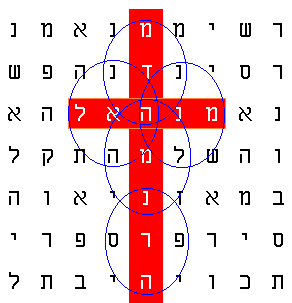
This hallowed picture is highly symbolic: The words of this bible code (as it forms this picture), of itself, tells us what the picture means! The 5 coins, (i.e., mene, mene, tekel, double-peres), are depicted here as being impaled upon the cross; and this cross is understood to be a menorah stripped of its branches. (The menorah [lamp] in the temple was patterned and shaped after the likeness of a lush almond tree, Ex. 25:31-40.)
Thus, the 5 coins are understood to be the silhouette (outline) of Jesus impaled upon the cross/pole! And we know already from the rest of the bible code that the 'coins' symbolize Christ as Redeemer, the One who pays the dept for man's sins by 'being numbered and weighed in the balances, broken' for us.
What the coins on the cross say:
The five coins along the (long) vertical beam:
(Compare the two vertical sets of 5 coins on the right and left
---they have the same patterns and number of letters as studied earlier!)

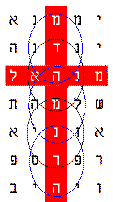 Symbolically
speaking, the
naked cross, (i.e., the menorah-almond tree stripped of its leaves and branches),
is now clothed instead with the Jewish Mina---Jesus Christ. Though
Himself naked on
the cross, Jesus clothes the naked tree! The Light of the world is the light of
the almond-tree menorah! He is the light of the lamp! And the bible
says, in turn, that the Lamb
is the Lamp of God! (Revelation 21:23-24). (The Hebrew Mina, here, is singular because all five coins
together represent and form the outline of the One Man, Jesus Christ. The five "coins," (circles)
just along the main pole read as normal, (i.e., in alternating directions):
Symbolically
speaking, the
naked cross, (i.e., the menorah-almond tree stripped of its leaves and branches),
is now clothed instead with the Jewish Mina---Jesus Christ. Though
Himself naked on
the cross, Jesus clothes the naked tree! The Light of the world is the light of
the almond-tree menorah! He is the light of the lamp! And the bible
says, in turn, that the Lamb
is the Lamp of God! (Revelation 21:23-24). (The Hebrew Mina, here, is singular because all five coins
together represent and form the outline of the One Man, Jesus Christ. The five "coins," (circles)
just along the main pole read as normal, (i.e., in alternating directions):
"Behold, a mina will certainly be numbered---He was judged to the uttermost! Behold, He languishes!---The Lamp wasted away because of foreigners!"
The word for mina, here, is Hebrew, although the numbering is by "foreigners"---Babylonians. The reading and numbering of the coins, speak for themselves, and bear out this interpretation.
It is important to recall that Jesus' own people, the Jews, rejected Christ, and to this day regard Him as a foreigner:
"...That was the true Light, which lighteth every man that cometh into the world. He was in the world, and the world was made by him, and the world knew him not. He came unto his own, and his own received him not," Jn. 1:9-11.
-
The five coins spread out over the whole cross:
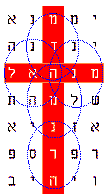
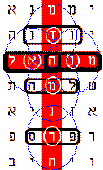 The 5 coins (see left) of the main picture bible code read from
top to bottom, each counterclockwise. This allows for the usual + - + - + etc.,
pattern to be followed when reading the coins along the vertical and horizontal beams
independently. The 5 coins here read:
The 5 coins (see left) of the main picture bible code read from
top to bottom, each counterclockwise. This allows for the usual + - + - + etc.,
pattern to be followed when reading the coins along the vertical and horizontal beams
independently. The 5 coins here read:
"Behold, the Mina will most certainly be numbered! Behold, He languishes---the Lamp languishes!"
The three letters that run like a 'label' across the 5 coins (above right), also produces an acrostic-type code. The middle encircled letters join with it to make it into a double acrostic. The 'labels' on the coins read:
"The One doing the judging says:
"The Mina of God was judged: But for what reason was He divided?"'"
(Lit. "Peres," and it is a play on words for:
"The Mina of God was judged. Why, then, a half-mina?")
(Notice the similarities of this bible-code word-puzzle, (in both content and shape), with the mene-tekel-peres one 'on the wall,' as studied in the previous document. Note that each coin spans an ELS of 15 x 2 skips, or 30 letters, and half-a-mina is also worth 30 shekels. Thus the riddle: "Why then a half-mina?")
The three coins along the (short) horizontal beam:
(Compare the two horizontal sets of 3 coins on the right and left
---they have the same patterns and number of letters as studied earlier!)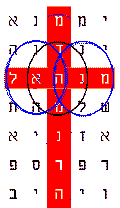
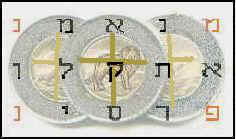 Similarly,
the three coins (to the right) along the horizontal cross-beam reads like the 5 vertical coins, both in format and in
word:
Similarly,
the three coins (to the right) along the horizontal cross-beam reads like the 5 vertical coins, both in format and in
word:
"Concerning the Mina, He was judged to the uttermost! Behold He languishes!"
Hence, there are 3 horizontal coins, or 5 vertical coins (which, therefore, includes the two missing ones referred to in the main mene, tekel, peres, bible code). Or we may read the cross here as simply having 5 'coins' spread out over the whole cross.
Hence, there are 7 coins altogether (or 8 if counting the middle one twice, which is overlapped). "Seven" is the number of perfection in the bible, "eight" of the 'new creation.' (The menorah-tree also had 7 branches.) However, all 7 coins do not appear meant to be read together since it is largely repetitive. The emphasis is on the '3' and '5 coins,' which are in agreement with the 3 and 5 coins in the writing on the wall.
Next, we look at this cross numerically, as the beams of the cross suggest:
"The garment/measurement of the Menorah is the Mina/numbering of God."
To part 4 of 5 parts... What are its measurements, anyway?
|
